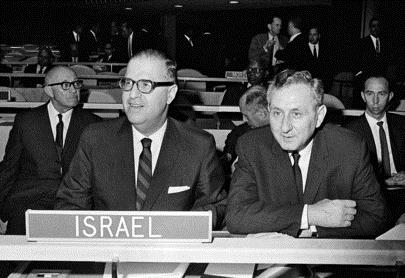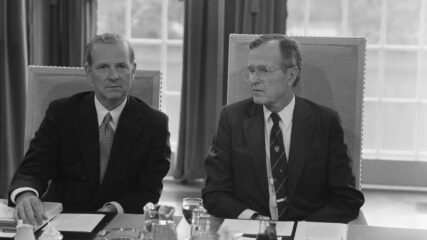June 3, 1967
Israel. Ministry of Foreign Affairs. “Speech by Israeli Ambassador Gideon Rafael to the UN Security Council.” Israel’s Foreign Relations: selected documents, 1947-1974. Ed. Medzini, Meron, and Chaim Yahil. Jerusalem: Ahva Press, 1976. 763-771. Print.

The crisis in the Middle East erupted without warning on May 16, 1967, when an Egyptian general sent an ultimatum to the commander of the United Nations Emergency Force (UNEF). At the same time that he asked for the removal of the United Nations force, he moved his own forces into the positions held by the United Nations. The course of the events that followed is by now common knowledge and well documented in the reports of the secretary-general.
The secretary-general [U Thant] tried to prevent the crisis from getting out hand. He failed. It was not his fault. Alarmed by the gravity of the situation, the governments of Canada and Denmark asked for the Security Council to be urgently convened. For 11 days now the council has debated the matter in an effort to resolve the immediate crisis. At the same time one Arab spokesman after another has come to this table not to alleviate the dangerous tensions, but to fan the flames of violence and hatred.
In their effort to obscure the real issue and the true causes of the situation created by their own arbitrary action, they have raked up the most far-fetched allegations and have had advanced arguments of monumental irrelevance. I have no doubt that more will come. The volume of this exercise is equaled only by its transparency.
Behind these verbal assaults three major Arab objectives can clearly be discerned: first; to lay a dense smoke-screen behind which their own aggressive activities can be concealed; secondly, to portray the intended victim of their aggression as the aggressor; and thirdly, to hypnotize, paralyze and intimidate the whole international community so that no one will interfere with their preparations for aggression.
This is not the first time that this maneuver has been practiced. It presents a very serious challenge to this organization. No one has expressed this in more stirring terms than His Imperial Majesty Haile Selassie in his memorable address before the General Assembly on October 4, 1963, when he said:
Twenty-seven years ago, as Emperor of Ethiopia, I mounted the rostrum in Geneva to address to the League of Nations an appeal for relief from the destruction which had been unleashed against my defenseless nation by the Fascist invader. I spoke then both to and for the conscience of the world. My words went unheeded, but history testifies to the accuracy of the warning that I gave in 1936. In 1936, I declared that it was not the Covenant of the League that was at stake, but international morality. Undertakings, I said then, are of little worth if the will to keep them is lacking.
While this debate had taken that course, events have not stood still. First Egypt and then one Arab country after another have rushed troops and armaments to our frontiers and created a most severe threat to Israel’s security and to the peace of the region. At the same time the spokesmen, first of Egypt and then of one Arab State after the other, have been getting into line to hurl their shafts of invective against Israel and of intimidation against the whole world. Claiming that they would not initiate offensive action against Israel, they have launched a campaign of unrestrained political warfare here in the Security Council in preparation for the total war which they openly proclaim to be their ultimate objective: As the Foreign Minister of Iraq himself said, “The conflict will be total and uncompromising … there will be no retreat” [1345th meeting, paras. 18 and 19]. I say to him, you need not retreat if you do not advance.
As violent and threatening as these Arab statements may sound, they are but a diplomatic echo of the venom which is being poured out twenty-four hours a day by the Arab propaganda machine. I would not take up the Council’s time by quoting from the Arab radio and Press were it not necessary to leave no doubt as to the extent to which the Arab Governments are inflaming the passions of their own people.
On 25 May, Radio Cairo in its broadcast at 2 p.m. proclaimed: “The Arab people is determined to wipe Israel off the map.”
On 26 May, the radio station of the Palestine Liberation Organization broadcast a press conference by Mr. Shukairy in which he said, “D-Day is approaching. The Arabs have waited nineteen years for this and will not flinch from the war of liberation.”
And on 29 May, the same Mr. Shukairy was even more explicit: “The struggle has begun at the Gulf of Aqaba and will end at the Bay of Acre.”
At 8 p.m. on 30 May, Radio Cairo had this to say: “Faced by the blockade of the Gulf of Aqaba, Israel has two choices, both of which are drenched with Israel’s blood: either it will be strangled by the Arab military and economic siege or it will be killed by the bullets of the Arab armies surrounding it from the south, from the north and from the east.”
On Egyptian television, on 1 June at 6:30 p.m., the commander of the Egyptian Air Force told his audience that “the Egyptian forces spread from Rafah to Sharm el-Sheikh are ready for order to begin the struggle to which we have looked forward for so long”. That is the background against which the present military confrontation is taking place. There comes to my mind a very fitting sentence by the late Adlai Stevenson. When his country found itself threatened, he said here in the Security Council: “Were we to do nothing until the knife was sharpened? Were we to stand idly by until it was at our throats?” [1025th meeting, para. 18.]
Faced by the combined effect of the headlong rush to arms in the Arab States, a propaganda barrage of unprecedented violence and proclamations of a holy war, it is only natural that my Government found itself under the elementary duty to place the country on a full defense footing. Two heavily armed armies are facing each other, one poised to invade and destroy Israel, the other to defend it. This is a most explosive situation which has been created by the Arab Governments. In this situation any incident could have the gravest consequences. Yesterday, the first clash of the present crisis occurred. Two Israel soldiers were killed and two were wounded in an encounter on Israel territory with an armed group of marauders from Syria. I have drawn the attention of the Security Council to this in my letter of last night [St7924].
The mutual reduction and withdrawal of armed forces to their normal levels and positions is the obvious first step towards alleviating this crisis.
This is not the first time that Israel has found itself facing such an emergency. The Arab spokesmen have been saying that Israel was born out of aggression. Aggression by whom? By Egypt, Lebanon, Syria, Jordan, Saudi Arabia and Iraq.
This is fully documented in the records of the Security Council for the summer of 1948. The Arab Governments are using today the same arguments to cover up their aggressive intent as they used then. At the 302nd meeting of the Security Council, Mr. Austin, representative of the United States, said, with reference to the Arabs:
They tell us quite frankly that their business in Palestine is political … Of course the statement that they are there to make peace is rather remarkable in view of the fact that they are waging war…” Therefore, here we have the highest type of evidence of the international violation of the law: the admission by those who are committing this.
The representative of the Soviet Union, Mr. Gromyko, the present Foreign Minister, at the 309th meeting of the Security Council addressed himself to the same situation. He said:
This is not the first time that the Arab States, which organized the invasion of Palestine, have ignored a decision of the Security Council or of the General Assembly. The USSR delegation deems it essential that the Council should state its opinion more clearly and more firmly with regard to this attitude of the Arab States towards decisions of the Security Council. It is not in the interest of the United Nations in general, or of the Security Council in particular, to tolerate such a situation, where decisions of the Council, designed to put an end to warfare … are being flouted.
This invasion by five Arab armies was thrown back by the young Army of Israel which had grown out of Haganah, the Jewish defense organization of which I am proud to have been a member. This war was terminated by the conclusion of General Armistice Agreements. These Agreements established the borders between Israel and the neighboring states. I would remind the Arab representatives that the only valid basis for the Egyptian presence in the Gaza area and for the Jordanian presence on the West Bank is in the armistice regime. They should therefore be more prudent before they disregard the significance and sanctity of the armistice demarcation lines.
The Armistice Agreements contain two fundamental and unalterable provisions. They were concluded with a view towards promoting the return to permanent peace. They stipulated the complete cessation of all forms of aggressive and hostile action. The Secretary-General, in paragraph 17 of his report of 26 May 1967 [S/7906], has called attention to Security Council Resolution 73 (1949) of 11 August 1949, which declared that “the Armistice Agreements constitute an important step towards the establishment of permanent peace”.
The Arab States have persistently refused to take a single step towards the restoration of peaceful conditions. On the contrary, soon after the conclusion of the Armistice Agreements, they initiated their campaign of piecemeal aggression. There lies the root cause of the turmoil, which has so adversely affected the Middle East over the years.
The Arab representatives have found in Paragraph 2 of the secretary-general’s latest report [ibid.] support for their policies. The secretary-general refers therein to “the continuing Arab-Israel conflict”. What the Arab representatives choose to ignore is that it is Israel that has made repeated efforts to arrive at a peaceful solution of the conflict and it is the Arab states that have rebuffed these efforts. It is their policy to continue the conflict.
In justification of that policy, the Arab governments claim that, in spite of the United Nations Charter and the General Armistice Agreements, they are in a state of war with Israel and are therefore free to conduct any act of belligerence of their Choosing. No lengthy argument is required to refute that doctrine. The Security Council, in its Resolution 95 (1951) of September 1, 1951, has ruled that “neither party can reasonably assert that it is actively a belligerent” under the armistice regime.
That resolution was validly adopted. Those who are urging for the full restoration of the Armistice Agreements must first insist that the States concerned forgo belligerence. On behalf of Israel, I can give this assurance. An armistice with built-in belligerence is no armistice.
The draft resolution submitted by the United Arab Republic (S/7919) seeks the endorsement of the Security Council for this policy. Its object is to promote the real aim of the Egyptian Government, which is not to return to the conditions of 1956, but, as President Nasser has stated himself, to go back to the situation prevailing in 1948 — in other words and in clear language, to abolish Israel’s independence. In his speech of 26 May, President Nasser left no doubt; he said: “Our basic aim will be to destroy Israel.”
How different were the hopes and expectations expressed by responsible leaders in 1956, when the late Secretary of State Mr. Dulles said at the 561st meeting of the General Assembly:
All of us, I think, would hope that out of this tragedy there would come something better than merely a restoration of the conditions out of which this tragedy arose. There needs to be something better than the uneasy armistices, which have existed now for these eight years between Israel and its Arab neighbors. There needs to be a greater sense of confidence and sense of security.
The question of belligerence is not an academic matter. The Arab governments, since the inception of the armistice regime, have not only upheld the doctrine of belligerence, but, much worse, have been practicing belligerence. They have practiced it in the Suez Canal; they have practiced it on land by countless armed incursions into the territory of Israel; by continuous threats against the territorial integrity of Israel, culminating in an act of war — the imposition of a blockade in the Strait of Tiran.
The representative of the United Arab Republic, and in his wake other Arab spokesmen, have raised two main arguments to justify the blockade of Tiran. The first is that Israel has no right to be at Eilat, or Umm Reshresh, as it once was called. I can dispose of that very briefly. The Arab contention that Israel has no right to be in Eilat at all is a mystification. Eilat was included in the Jewish State by the General Assembly’s resolution of 29 November 1947 [181 (II)]. In May 1949, Egypt complained to the Mixed Armistice Commission about the Israel presence at Umm Reshresh. On 8 February 1950, after very careful consideration, the Mixed Armistice Commission rejected — I repeat, rejected — the Egyptian complaint that the occupation of Umm Reshresh was a violation of the Armistice Agreement. But what determines the issue is the Israel-Jordan General Armistice Agreement, by which Umm Reshresh — Eilat — is placed on the Israel side of the border. I invite the attention of the members of the Security Council to the map attached to that agreement, which can be found in the Security Council’s official records.
Another argument is based on the doctrine of belligerency which, as I have already said, is outlawed under the armistice regime, and under the Charter.
The third argument is that the Strait of Tiran is not an international waterway. The question of the international character of the waterway, which, in the opinion of my Government, has always been clear, was authoritatively answered at the eleventh regular session of the General Assembly and at the 1958 Geneva Conference on the Law of the Sea. Both the International Law Commission and the Geneva Conference stated quite clearly that there must be no suspension of the right of innocent passage through international straits. Article 16, paragraph 4, of the Convention on the Territorial Sea and the Contiguous Zone of 1958 embodies the generally accepted rule of international law governing straits.
The representative of the United Arab Republic has said [1344th meeting] that the International Law Commission stated that its draft articles on the law of the sea regulate the law of the sea in time of peace only. He omitted to mention that this view was not adopted by the Geneva Conference. In any case, this whole argument is irrelevant, because the Egyptian claim of belligerency is inadmissible.
The Egyptian government itself has recognized the international character of the Strait of Tiran and its obligations under the recognized principles of the law of nations. In its aide-Memoire to the United States government of 28 January 1950, it undertook “that this passage, the only practicable one, will remain free, as in the past, in conformity with international practice and recognized principles of the law of nations”.
On February 20, 1957, President Eisenhower declared:
Now, with reference to the passage into and through the Gulf of Aqaba, we expressed the conviction that the gulf constitutes international waters and that no nation has the right to prevent free and innocent passage in the gulf. We announced that the United States was prepared to exercise this right itself and to join with others to secure general recognition of this right.
On 1 March 1957, the representative of France declared in the General Assembly:
The French Government considers that the Gulf of Aqaba, by reason partly of its breadth and partly of the fact that its shores belong to four different States, constitutes international waters. Consequently it believes that, in conformity with international law, freedom of navigation should be ensured in the gulf through the straits which give access to it.
On March 4, 1957, Prime Minister Lester Pearson, the then chairman of the Canadian delegation, declared in the General Assembly:
Concerning the Gulf of Aqaba and the Strait of Tiran, I suggested then that there should be no interference with innocent passage through those waters, nor the assertion of any claim to belligerent rights there.
The representative of Denmark declared on March 4, 1957, at the same meeting of the General Assembly:
In the view of the Danish government, the Strait of Tiran must be regarded as an international waterway through which vessels of all nations have a right of passage.
I would take up too much of the Council’s time if I were to quote all the authoritative statements affirming the international character of the Straits of Tiran. In recent days more statements to that effect have been issued by many governments.
The foreign minister of Iraq, in support of his arguments in favor of the blockade of the Gulf of Aqaba, has stated that not a single resolution was adopted by the United Nations on the problem of navigation in the Gulf of Aqaba. Since when does the United Nations have to adopt a resolution on freedom of navigation through international straits? Are rights of free navigation in the Skagerrak or any other international strait impaired by the fact that the United Nations has not adopted a resolution?
But, again, we are arguing not an academic legal point, but a matter which the Secretary-General accurately described as being most vital to Israel’s interest. While in Cairo, he called to the attention of the Government of the United Arab Republic the dangerous consequences which could ensue from restricting innocent passage of ships in the Strait of Tiran.
Eilat, a thriving port and industrial center, is Israel’s outlet to the Red Sea. It links our country with Africa and Asia. Considerable trade passes through this essential maritime route. Eilat is one of the main ports for the export of chemicals and fertilizers so urgently needed to keep up the world’s food supplies. It is the terminal of an oil pipeline connecting it with Haifa. The maritime trade passing through Eilat is the basis of the city’s economic life and the life of the hinterland of that city. Severing the artery is an act as grave as an attempt to truncate part of our territory. It is a curious thing that those who are responsible for proclaiming the blockade and creating the current crisis come here and belittle the significance of their action for Israel. But if that is so, why do they go to such lengths and create a situation so fraught with dangers?
They are following the same line as was used by the Nazis in 1939 when they took over Danzig. They broke down resistance by belittling the significance of their act and by diverting attention from their ultimate objectives. The world has paid a terrible price for that appeasement. The Nazis launched the theme — Why fight for Danzig? —and that is what we have heard here: Why fight for Eilat? Mr. Shukairy has given us the answer in that broadcast to which I referred earlier: first the Gulf of Aqaba and then the Bay of Acre. Israel is determined to make its stand on the Gulf of Aqaba. Nothing less than complete non-interference with free and innocent passage through the Gulf of Aqaba is acceptable to the Government of Israel.
Arab representatives have attached themselves with ardor to Paragraph 8 of the secretary-general’s first report of March 19, 1967 {S/7896]. On reading that report and that paragraph we were puzzled and asked ourselves to what statements the secretary-general was referring. We were unable to find the answer in our own files. Various Arab spokesmen have now enlightened us by attributing to responsible leaders of Israel statements to the effect that Israel was ready to march on Damascus and to overthrow the Syrian government. I am grateful to the Arab representatives for giving us this clarification. However, I am sorry that I cannot oblige them and confirm their allegations. I can state quite categorically that no such statements have been made. In a previous intervention, I assured the council and the representative of Syria that Israel has no interest in the nature of the regime in Syria or in its activities, so long as they are confined to Syria.
Having said that, I should like to point out that for the 20 years of its existence Israel has been subjected to a constant barrage of vituperation and threats of exceptional vehemence. Every conceivable medium of mass communication has been mobilized for this campaign.
The Arab governments have given as a pretext for their present mobilization and military activity alleged Israel troop movements and concentrations, which the secretary-general has reported never took place, and statements of Israel leaders, which have never been made. The archives of the Israel government are bulging with the unending torrent of abuse and threats from Arab leaders against the very existence of Israel. If we were to follow the Arab logic, every one of those statements would be a sufficient reason to take up arms. But it is not the statements alone which are causing the present crisis. This time these verbal threats are linked to military preparations on an unprecedented scale. These statements are no longer hurled into the air. They are now falling on inflammable ground where two armies are standing face to face.
The situation with which the council is confronted today has deteriorated since the council first met on this question. In my statement on 29 May [1343rd meeting], I urged that five immediate steps be taken. None of them has been taken. On the contrary, the Arab governments have intensified their preparations for war. It is not a breathing spell which will avert the present danger. What is required is action, concrete steps to forgo all belligerence and to withdraw the armies back to their previous positions.










